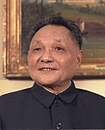Deng Xiaoping (Pinyin: Dèng Xiǎopíng, [tɤŋ˥˩ ɕjɑʊ˩ pʰiŋ˧˥] ; 22 August 1904 – 19 February 1997) was a politician and reformist leader of the Communist Party of China who, after Mao's death led his country towards a market economy. While Deng never held office as the head of state, head of government or General Secretary of the Communist Party of China (the highest position in Communist China), he nonetheless served as the "paramount leader" of the People's Republic of China from 1978 to 1992. As the core of the second generation leaders Deng shared his power with several powerful older politicians commonly known as the Eight Elders.
Born into a peasant background in Guang'an, Sichuan, Deng studied and worked in France in the 1920s, where he was influenced by Marxism-Leninism. He joined the Communist Party of China in 1923. Upon his return to China he worked as a political commissar in rural regions and was considered a "revolutionary veteran" of the Long March. Following the founding of the People's Republic of China in 1949, Deng worked in Tibet and other southwestern regions to consolidate Communist control.
Deng was instrumental in China's economic reconstruction following the Great Leap Forward in the early 1960s. His economic policies, however, were at odds with the political ideologies of Chairman Mao Zedong. As a result, he was purged twice during the Cultural Revolution, but regained prominence in 1978 by outmaneuvering Mao's chosen successor, Hua Guofeng.
